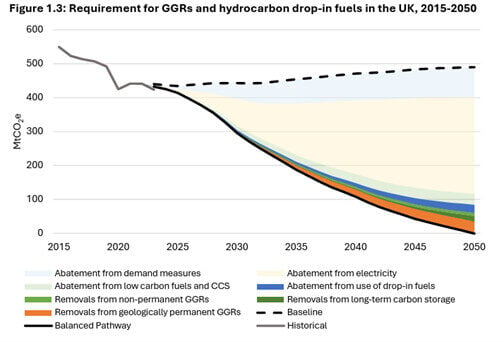NEWS & INSIGHTS | Opinion
RGU’s METASIS 2.0 wins £800k to pioneer clean hydrogen with nuclear waste heat

Chief Technology Officer at NZTC, Luca Corradi, and his team closely monitor the global net zero landscape. They follow the trends, policies, investments and technological innovations that, together, bring the world closer to its shared climate goals. Learn more about our horizon scanning service. This week, Luca and his team look at strategic innovations in floating offshore wind, GGR policy, and clean hydrogen R&D.
BASQUENERGY Cluster launches I3FLOAT project to boost cross-regional innovation in floating wind energy
I3FLOAT, a European project aiming to strengthen the European floating offshore wind (FOW) value chain through cross-regional innovation and investment, has officially launched. Co-funded by the European Union and coordinated by the Basque Energy Cluster, the I3FLOAT project unites 24 partners from eight regions, including seven other associations and clusters.
Over the next three years, I3FLOAT will support the scale-up of advanced FOW technologies and promote co-operation between regional innovation ecosystems. A key objective of the project is to empower small and medium-sized enterprises (SMEs) in less developed regions by establishing collaboration ecosystems between more and less developed regions.
The project will test new technologies and processes in four pilot projects:
- A Belgian Pilot – reinforcing the supply chain, anchoring systems and digital monitoring of floating wind turbines. This pilot uses a semi-submersible floating platform.
- DemoSATH in Spain – fibre-reinforced concrete foundation, forecasting models and inter-array cable systems.
- EOLINK in France – optimisation of logistics and automated steel component manufacturing.
- W2Power Floater – monitoring at component level and multi-layer underwater structures.
The project will provide up to €60,000 financial support to as many as 50 SMEs, as well as tailored advisory services. I3FLOAT will develop a Floating Wind Innovation Roadmap, create business support tools, and encourage knowledge transfer between regions.

UK Greenhouse Gas Removals (GGRs): 30 recommendations to achieve net zero and carbon budgets
Greenhouse Gas Removals (GGRs) have an essential role in achieving net zero in the UK. The Independent Review provides 30 recommendations for the UK government to ensure prompt deployment of greenhouse gas removals (GGRs) and meet carbon budgets. Key recommendations include:
- Amend the Sustainable Aviation Fuels (SAF) mandate to a Net Zero Aviation (NZA) mandate, ensuring that all flights taking off from the UK are climate-neutral by 2045. This should drive procurement of both SAF and permanent GGRs.
- Develop a GGR Strategy to outline the contribution of GGR solutions required to meet carbon budgets and net zero, and create clear UK standards for DACCS and BECCS.
- Minimise reliance on imported biomass feedstocks. Whilst imported feedstocks for biomass with carbon capture and storage (BECCS) can deliver GGRs, land use pressures mean sustainable biomass feedstock production is likely to be limited.
- Establish an Office for GGR, to produce more coordinated action on GGRs and enable quicker rollout of policy and project deployment.
- Exploit growth opportunities by positioning the UK as a leader on GGRs and in international climate cooperation.
- Embrace geological net zero so that residual fossil fuel emissions are balanced by geological permanent removals, not trees or soils.
Set up new innovation funding and R&D with additional support for pilot- and mid-scale projects with additional support for pilot- and mid-scale projects.

Requirement for GGRs and hydrocarbon drop-in fuels in the UK, 2015-2050
Credit: The Independent Review
Robert Gordon University secures £800,000 for solid oxide steam electrolysers (SOSE)
Robert Gordon University (RGU) researchers have secured £800,000 in funding from the Engineering and Physical Sciences Research Council (EPSRC) to advance solid oxide steam electrolysers (SOSE) as part of the METASIS 2.0 project, a collaborative UK hydrogen production research initiative.
SOSE produce clean hydrogen using electricity and heat. They require very high temperatures (600–900 °C) but have high efficiency, particularly when using waste heat from nuclear power generation or industrial processes. The hydrogen produced is free from impurities, making it a suitable fuel in polymer electrolyte membrane (PEM) fuel cells.
METASIS 2.0 aims to produce hydrogen with waste heat from nuclear rather than electrical power to optimise efficiency and mitigate waste. It is a collaborative effort across several leading institutions, including RGU, the University of Surrey, and the UK’s National Nuclear Laboratory. It builds on previous work where RGU researchers designed a tubular cell that can withstand the high temperatures associated with SOSE systems.

Credit: Robert Gordon University
Subscribe for the latest updates



